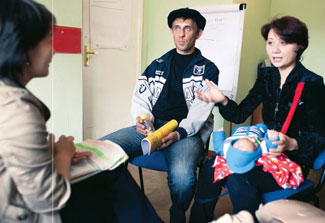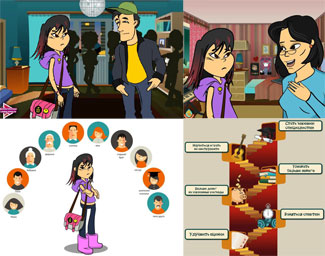Scientists tackle disease in Kazakhstan drug injectors
July / August 2015 | Volume 14, Issue 4

Photo courtesy of Columbia University
Couples learn about safe needles use and sex practices as
part of a National Institute on Drug Abuse research project to
reduce HIV and other diseases.
By Cathy Kristiansen
HIV and other sexually transmitted diseases are burgeoning health problems in Kazakhstan among people who inject heroin and practice unprotected sex. To intervene in this population and reduce ripple effects in the wider community, researchers supported by the National Institute on Drug Abuse (NIDA) have designed programs targeting couples, female sex workers and at-risk youth.
Kazakhstan, formerly in the Soviet Union, is located on a major drug trafficking route in Central Asia where, in some towns, as many as 10 percent of the population injects drugs. The country also has one of the fastest growing HIV epidemics in the world, according to the UN, with new infections up 25 percent in 2011 than a decade earlier.
One harm-reduction study focused on couples in which one person or both injected drugs. Participants learned communication and negotiation skills, problem solving, joint goal-setting and practical tips about condom use and safe injection practices. The program also covered testing for HIV and sexually transmitted diseases, overdose prevention and how to nurture healthy relationships.
Dr. Nabila El-Bassel, of the University of Columbia, who led the study, noted that participants liked the safe environment provided for discussing sensitive issues with an impartial third party and they felt it was bonding to have both parts of the couple participate. A year later, sexual and drug risk behaviors were down and hepatitis C incidence had tumbled 69 percent.
Another at-risk group in Kazakhstan is drug-injecting women who participate in transactional sex; at least a third of them are infected with HIV and other diseases. El-Bassel found that many of the women would prefer alternative jobs, so she and her team designed a health promotion program that also teaches skills for occupations such as hairdressing or baking and develops financial literacy - including how to budget, conduct financial negotiations and build a bank account. The women's savings are matched weekly with funds from the project, and are intended to help them transition to their new profession and reduce income from sex work. If successful and cost-effective, similar interventions could be adopted elsewhere, El-Bassel suggested.
The HIV risk is high not only for adults, but also for adolescents in Kazakhstan. A quarter of youth exposed to drugs at home or in the community will take up substance abuse and/or risky sex at 15-17 years of age, so this is a crucial stage to emphasize health protection. Dr. Leyla Ismayilova, of the University of Chicago, and her colleagues are testing a novel family-based multimedia intervention with youth and their caretakers.
"In the Soviet Union, parenting was strict, more about setting rules, less about open dialogue," Ismayilova said. "Parents would talk with the child about what you want for dinner, but not emotions, relationships, or risk situations that adolescents are confronted with these days. We need interventions that are appropriate for the different local culture of Central Asia today."

Images courtesy of Dr. Leyla Ismayilova
National Institute on Drug Abuse grantees in Kazakhstan use
multimedia to discourage risky behavior.
Avoiding didactic messages, which the adolescents hear in school, Ismayilova's project builds communication and coping skills via computer software that engages participants with storylines, quizzes, games and role playing. Teens identify five life goals and steps to achieve them, and practice resisting peer pressure to engage in drug use and unsafe sex. In this at-risk group, parents might be unavailable, so the teens name three adults they can turn to, whether a relative, teacher or friend's parent, and practice the kinds of discussions they might have. Caretakers learn communication skills, such as how to speak calmly if a teen arrives home late at night or talks back, and how to talk about their own emotions.
By training scientists and funding research in Kazakhstan, El Bassel said NIH-supported programs are helping build a knowledge base about HIV and drug-use interventions that the government is incorporating in its decision making. "Kazakhstan has developed and expanded HIV evidence-based services and treatment for people who use drugs, which is valuable in our efforts to also reduce HIV."
More Information
Access a collection of resources and publications related to this article, including related NIDA-supported projects:
To view Adobe PDF files,
download current, free accessible plug-ins from Adobe's website .